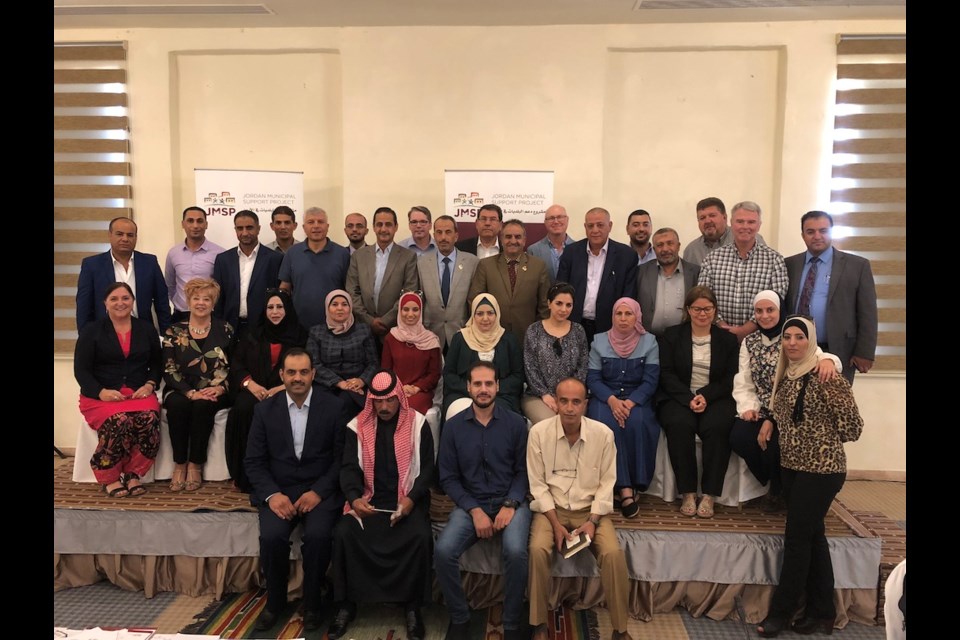A delegation from Yorkton has just returned from Jordan. The city, along with Colchester County, Nova Scotia, is participating in the Jordan Municipal Support Project, a four year project implemented by the Federation of Canadian Municipalities (FCM) and financed by Global Affairs Canada to mobilize expertise from Canadian municipalities to assist small towns and municipalities in Jordan.
Councillor Randy Goulden was part of the Yorkton delegation which went to Jordan as part of the 12 day mission to meet their equivalents in municipalities and small towns in the central part of the country.
Yorkton was chosen as one of the two municipalities to participate out of the twenty applications due to its expertise in solid waste management, Goulden said, something that communities need in Jordan, as the country is dealing with a large population increase due to an influx of Syrian refugees. That population increase has lead to their solid waste management system being over capacity, and they are looking to Yorkton and Nova Scotia - also considered to be on the cutting edge of solid waste management - to help them learn how to deal with the pressures on their waste systems.
“Some of them that we talked with are hauling their garbage up to 40 kilometers away. That’s where they have to go, they’re in desert climate, they’re in a lot of rock, their landfills are quite a ways away. One of the communities we’re dealing with, they receive the garbage from Petra and Wadi Musa. Petra is one of the ancient wonders of the world, they get an incredible amount of tourists there, so this community looks after their landfill. Eighty five per cent brought into their landfill is from Petra, but they’re getting no funding from it, so they’re covering costs. Just as our community is always looking at costs and revenues, so are their communities.”
One of the areas where Yorkton’s solutions will work is sharing landfills with surrounding communities, as both here and there, smaller communities cannot necessarily afford to build landfills and meet regulations.
While Jordan might be halfway around the world and is considered to have an entirely different climate than Saskatchewan, Goulden said they quickly discovered that they faced many of the same challenges, including some you wouldn’t expect.
“What we learned was that of the six municipalities that we worked with, three of them have challenges with snow removal. They’re high altitude, they’re in mountain ranges, and they get snow like we do. It doesn’t last as long, but they get snow that can completely shut down their municipalities. At times they even call in the military… Even though we are halfway around the world and different climates, there are more similarities than differences.”
Another similarity surrounds water, and keeping water potable. Goulden notes that as a desert climate, water is very precious in Jordan, and they were amazed by the sheer number of wells Yorkton has access to, but there remains concerns in both places about keeping wells usable in all communities.
“We have concerns with all the regulations we have to follow in our countries concerning water and landfills, but when you go visit another country like that you can see why those things are downloaded from other orders of government. The concern we have is you get the downloading but you don’t get any assistance with funding.”
Jordan is also interested in how much municipalities in Canada have to fund themselves.
“That’s something that they asked too, because they have a central government who has been doing a lot of de-centralization. In Jordan, municipalities are not responsible for police and fire, they were interested because that’s very costly, 29 per cent of our revenues go to police and fire protective services in our community.”
Yorkton certainly has some advantages over Jordan, and they have discussed different things beyond solid waste management.
“We’re very fortunate over here, we have incredible recreation facilities and programs. That’s not what they have over there, they don’t have the priorities around that. They’re just trying to function, keep their roads, their streets and their landfills, those kind of programs that they support. So when they see our Gallagher Centre, or our green parks, they’re very envious, those are the things we’re starting to discuss with them.”
The information exchange is not a one way street, and Goulden notes that they are learning from the Jordanian municipalities as well. She’s encouraged by the way Jordan encourages women to participate in their political systems, with half of the municipal councils required to be female.
“That’s an interesting perspective, of course we don’t have that here… With half of our population being women, are we missing something?”
She also believes Yorkton can learn from Jordan when it comes to community engagement.
“They do some really interesting things. They have town hall meetings, social media plays a really big part in what they do. Everyone there has cell phones, landlines, even at the city offices, are rare, so seeing how they use their social media is something we can learn from and do better with.”
It’s a four year program, and while the initial delegation has returned, Yorkton is going to continue sending people to Jordan. Michael Buchholzer, director of environmental services, will be going to Jordan with his equivalent from Nova Scotia.
“Perhaps we can learn something from [Nova Scotia] too… It’s about knowledge sharing and capacity building,” said Goulden.



